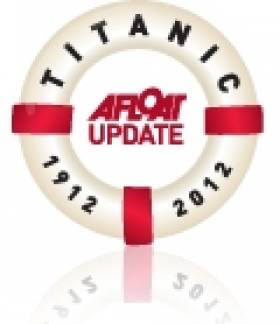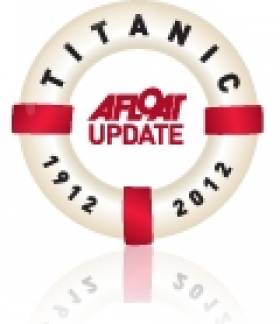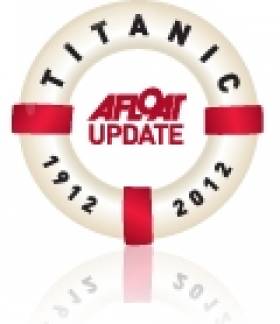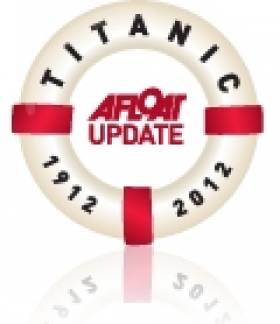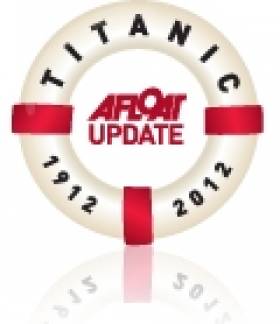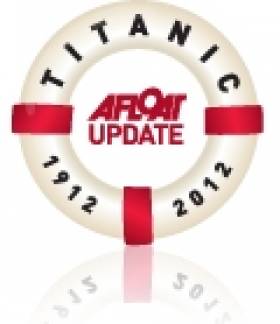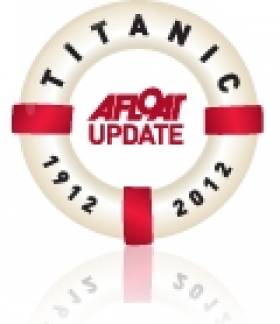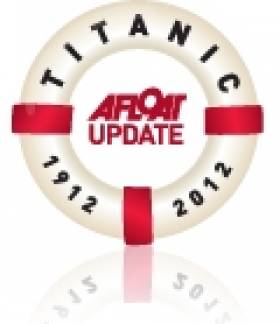Displaying items by tag: Titanic
Titanic In Song
#TITANIC IN SONG – A musical evening 'Titanic in Song' by Dara MacMahon and Gerry Noonan accompanied by Pauline Cooper will be held in the National Maritime Museum of Ireland, Dun Laoghaire on Friday 15th June. Tickets cost €10 each and the event starts at 8 o'clock.
Explore the Titanic story through the songs heard and played by the passengers on the ship. From the light classical and musical comedy numbers familiar to the 1st and 2nd class passengers to the music hall, vaudeville and Irish songs popular in steerage. The evening will present a unique look at the music played on that fateful journey.
The museum which is run by volunteers and members of the Maritime Institute of Ireland was re-opened last month after years of renovation work was carried out at the former Old Mariners Church. For further information and on the museum and its activities visit www.mariner.ie
Free Titanic Event at Blanchardstown Library
#TITANIC - This Saturday 26 May, Blanchardstown Library presents a series of talks and discussions on the history of the Titanic.
In her talk 'How the Titanic Touched My Family', author Martina Devlin tells the story of her grandmother's uncle Tom O'Brien, a farm labourer from Co Limerick who made plans to emigrate to America on board the ill-fated ship, but didn't tell his family he was taking someone with him - leading to a secret that was hushed up for generations.
Stephen Cameron will also be discussing his book Titanic - Belfast's Own, which looks at the ship from the perspective of those who helped to build it and "bring the dream to life".
Meanwhile, Patrick Fitzgerald of the Centre for Migration Studies at the Ulster American Folk Park gives his talk, 'A Window on Emigration', that accompanies the park's exhibition highlighting the stories of Irish emigrants who embarked for a new life in the New World on board the Titanic.
And Ed Coughlan of the Irish Titanic Historical Society will present his talk 'Titanic - A Voyage Into History', giving an overview of the Titanic story.
Registration is at 10.45am on the day, with the first talk starting at 11am. The event is free but booking is required on 01 8905563.
The 13 Deadliest Shipwrecks in History
#TITANIC - Irreverent tech website Gizmodo has marked the 100th annversary of the sinking of the Titanic with a list of the 13 deadliest shipwrecks in history.
The list runs the gamut from well over a century ago, in the early days of passenger shipping - see the SS Sultana, a tragedy overshadowed by the assassination of Abraham Lincoln and the end of the American Civl War - to more recent events.
Included are such as sad tales as that of the Empress of Ireland, the worst disaster in Canadian maritime history in which more than 1,000 died, and much closer to home the Lusitania, which went down off Kinsale in May 1915 after a torpedo attack.
But the worst was arguably suffered by the passengers of the steamship SS Kiangya - which blew up 50 miles north of Shanghai in December 1948, taking as many as 3,920 lives - and the horror that befell the MV Doña Paz in the Philippines in December 1987, where estimates put the death toll at an unbelievable 4,000.
Gizmodo has more on the story HERE.
First Irishman to Dive Titanic Site Shares His Story
#TITANIC - To mark the 100th anniversary of the sinking of the Titanic, JOE.ie sat down with the first Irishman to dive the historic wreckage.
In 2000, Rory Golden descended two-and-a-half miles beneath the surface of the Atlantic to witness the Titanic's watery gravesite.
“When I first cast my eyes on the wreck," he says, "for me it was just an incredibly exciting and equally humbling and incredibly poignant moment and you have all these emotions all at once because you are looking at something very few people in the world have seen.”
Amazingly, the self-avowed Titanic expert wasn't originally a part of the dive team for the expedition.
"My role at the time was to be the dive safety supervisor, but that whole role changed over the course of the expedition," he says. “There was no guarantee of me going down there because I was very low in the pecking order."
But a memorial plaque he brought with him from Cobh ended up being Golden's ticket to the TItanic, joining the crew aboard an 18-tonne Russian submarine.
And he came back with more than memories, too, as a glint in the corner of his eye turned out to be the remains of the ship's wheel.
"I was the first person to touch the wheel of the ship since it went down in 1912 and probably the last person to hold it before it went down was Captain Smith.”
JOE.ie has much more on the story HERE.
'Belfast Built Ships' Documents Much More Than Titanic
#BOOK REVIEW – This is a book which documents the entire output of the Belfast shipyards since construction of the first ship "Silistria", launched in 1854, was begun by Robert Hickson. Interestingly Belfast had no natural advantages for the building of ships, no ready supply of raw materials, no tradition of shipbuilding, no major ship-owners, no skilled labour in metalwork and engineering. How did it happen that a provincial town, which became a city only in 1888, developed into one of the world's great industrial centres? The author has a detailed series of analyses which answer this question in terms other than the usual suggestions of nepotism, Protestant work ethic and sheer good luck. They make interesting and enlightening reading.
At the core of the book is a beautifully presented catalogue of ships in which data for each of 1589 vessels totalling 13,886,873 tons is laid out in table form. Interesting historical notes are added by way of lively narratives as appropriate. At intervals on facing pages there are line drawings or good side view photographs mostly arranged in groups of five ships to a page. The result is a pictorial history of developments in general design and layout over one hundred and fifty years which I found instructive.
The narrative section of the book begins with an account of the creation of the three Belfast shipbuilding companies. In 1853 Belfast Harbour Commissioners leased out a yard on Queen's Island which Edward Harland was appointed to manage in 1854 and purchased in 1858. Out of this came Harland and Wolff. A second yard, McIlwaine and Partners, was set up in 1867 and in 1879 two trained premium apprentices left positions in Harland and Wolff to start a third yard, Workman Clark, at a site next to their former employer. These were not the ailing shipyards to which our generation later became accustomed but dynamic fast-growing businesses perhaps more like what we see today in certain information technology sectors and they were set up by very young men. Harland was twenty-three years old when appointed and Workman and Clarke were twenty-three and eighteen years old respectively. Their stories are exciting and dramatic.

The author next deals with Output of the Belfast Shipyards in which he explains the impact of developments in economics, commerce, politics and technology over a span of one hundred and fifty years. How he achieves this is worthy of study i.e. how he spans from the era of sail all the way to air travel while still keeping the thread of his story. Basically he breaks the one hundred and fifty years into eight slices of unequal but meaningful time spans thereby making the subjects accessible to the reader. Each of these sections has its own interesting developments but in 1940 there is a surprise. Suddenly she is there again, two hundred feet long, broad, chunky and graceless, would roll on wet grass: "Compass Rose" the fictional Flower Class Corvette and heroine of Nicholas Monsarrat's famous book "The Cruel Sea" is under construction. Belfast built 34 of these corvettes and the extract from Monsarrat's book is quoted to describe their appearance. Of course the effect was to send me scurrying to the attic for my dog-eared 1956 copy of the book to see if the magic of Monsarrat's prose still works. It does, and maybe that's what a book like "Belfast Built Ships" is really for - to send you scurrying down the corridors of memory.
With regard to "a famous White Star liner lost on her maiden voyage" the author is restrained and factual throughout. However in the third section of the book entitled Urban Myths and Forgotten Histories the gloves come off and his weapon of choice is the undisputable fact. His first target is those who claim "The greatest loss of life in a disaster involving a Belfast ship was on Titanic", next the hapless Nomadic myth is demolished, then on to her correct Yard Number – it is 401 not 909E. The carnage of myths continues but I cannot get my mind off that wrong yard number 909E. Does anyone else get a whiff of the Opium of the People?
I found the author's balanced comments an antidote to the current mania for blather on events in the Atlantic in April 1912. In fairness he is never critical of any aspect of the Titanic herself which he describes as "one of the greatest ships of its kind produced in Belfast, or indeed anywhere". His main criticism is of the cult that has grown up around this one ship as if it were the only important example of Belfast shipbuilding. Significantly his vocabulary may contain the explanation of what is going on when he describes the cult as "monodical". Monody is a term from Greek tragedy and there is much of Greek tragedy and mythology in the Titanic story. The name Titanic itself is straight out of Greek mythology and the great sin of Greek tragedy, Hubris, is to be found all over the story as routinely related. Perhaps it is an encounter with poetic truth which draws people back again and again to this rather than other maritime stories?
This is a book which will delight all "ship freaks" and provide them with hours if not years of ongoing pleasure exploring its seemingly endless corridors of enquiry. The quality of the research and presentation ensures that it will be of ongoing value to social researchers and transport historians and it is also a book which will please anybody who worked or has ancestors who worked on any of the 1589 ships. Most importantly it will have special significance for those thousands of people whose families worked in the Belfast yards. The yards have now ceased building ships but as they move from industry into history a large part of them survives in this formidable account of their formidable output. J K
BELFAST BUILT SHIPS
By John Lynch. Published by The History Press
Softcover, 303 Pages, ISBN 978 0 7524 6539 5
Price £19.99
Titanic Emergency as Ill Passenger Airlifted
#TITANIC - The Titanic memorial cruise was yesterday forced to turn back just 100 miles from the southwest coast of Ireland after a passenger fell ill, BBC News reports.
The Irish Coast Guard rescue helicopter at Shannon was dispached to the MS Balmoral to retrieve BBC cameraman Tim Rex, 56, who was struck by a non-life threatening heart condition, according to the Irish Independent.
Rex, who was covering the memorial sailing for the BBC, was treated by ship's doctors before being airlifted to hospital as a precaution.
The emergency happened just hours after the ship departed Cobh, the last port of call of the ill-fated Titanic before it sank in the North Atlantic on 14 April 1912.
A spokesperson for Titanic Memorial Cruises confirmed that despite the delay, the ship is still on schedule and is expected to arrive at the Titanic wreck site as planned on Saturday.
Tennis Duo's Untold Titanic Story
#TITANIC - The Irish Times has highlighted "one of the less well-known tales of the disaster" of the Titanic, regarding two tennis champions who went on to enter that sport's hall of fame.
The story of Richard Williams and Lark Behr was told at an exhibition of sporting memorabilia in Yorkshire last month by collector Robert Fuller.
Williams, who was 21 at the time, was headed to the US Championships when the Titanic went down. He was among those rescued by the Carpathia after hours in frozen water, and fought with that ship's doctor who wanted to amputate his legs.
His persistence paid off, as just months later he was in the quarter finals of the US Open, a context he would win in 1914 and 1916, not to mention the Wimbledon doubles title in 1920 and Olympic gold in the mixed doubles in 1924.
Behr - who reportedly proposed to his fiancée on a lifeboat - also had a glittering career after the tragedy, reaching the doubles final at Wimbledon and number three in the US rankings.
Meanwhile, BBC News has posted an infographic that follows in detail the critical moments leading up to and after the Titanic struck the iceberg that sealed its doom at 11.40pm on Sunday 14 April 1912.
#TITANIC - A Belfast man who saw the Titanic launch from the Harland and Wolff shipyards more than 100 years ago was guest of honour at the opening of Titanic Belfast at the weekend.
"It's like our Sydney Opera House," 105-year-old Cyril Quigley told BBC News of the £97 million (€116.7 million) visitor centre, opened on the 100th anniversary of the infamous ocean liner's tragic demise.
"My father and mother took me to Workman and Clark shipyard which is on the opposite side [of Belfast Lough] to watch the launch," he recalled to the Belfast Telegraph.
"I just saw a mass of metal in the gantries that they built for it and all I saw was this big thing sliding out into the water. I was only four-and-a-half."
Quigley described the new facility - designed to echo the imposing bow of the Titanic - as "wonderful", a sentiment echoed by Belfast Lord Mayor Niall O'Donnghaile who said: "The Titanic belongs to Belfast but this spectacle - Titanic Belfast - belongs to the world."
First Minister Peter Robinson was joined by Deputy First Minister Martin McGuinness at the ribbon cutting ceremony on Saturday 31 March, with the former declaring that this is "a new era in this province".
Titanic Belfast is expected to attract more than 400,000 visitors in its first year, and some 100,000 people have already purchased tickets. It will also be one of the largest employers and recruiters in Northern Ireland's tourism industry, as previously reported on Afloat.ie.
But the public's reaction so far has been mixed, according to The Irish Times, with some expressing disappointment at the lack of any large-scale model of the ship, and that the replica of the ship's famous staircase is hidden from public view in the venue's banqueting hall.
Titanic As She's Never Been Seen Before
#TITANIC - Next month's edition of National Geographic magazine features startling images with the first ever complete views of the wreck of the Titanic.
The large-scale panoramas were produced by combining "thousands of high-resolution images" of the wreck on the North Atlantic sea floor, according to the Guardian - which has a sample gallery of the Titanic as it is today HERE.
Titanic Belfast 'Is Designed to Impress'
#TITANIC - The Independent's Simon Calder reports on his special preview of Titanic Belfast, the £97 million (€116.3 million) tribute to the ill-fated ship on Belfast Lough.
"For once, the term 'of Titanic proportions' applies literally." he writes. "The top of the five-storey building is exactly as high as the tip of Titanic when the transatlantic liner was completed at the Harland and Wolff yard a century ago."
The monument is not only intended as a tribute to the tragedy, but also as a beacon to attract tourists to the "open, friendly city" of Belfast that has emerged after decades of the Troubles.
The travel writer compares the city's plans to the renaissance of Bilbao in northern Spain - like Belfast, a former shipbuilding centre damaged by terrorism that has become "a vibrant, elegant city that stands alongside Amsterdam, Barcelona and Berlin" thanks in part to the bold architecture of the Guggenheim museum.
Calder adds: "Almost every aspect of Titanic Belfast chimes with the city beyond the structure's metal jacket and big windows. And as with Titanic herself, the fitting out is designed to impress."
As previously reported on Afloat.ie, Titanic Belfast will be one of the largest employers in Northern Ireland’s tourism industry, as well as one of the North’s largest recruiters, when it opens later this month.
The Independent has much more on the story HERE.


























